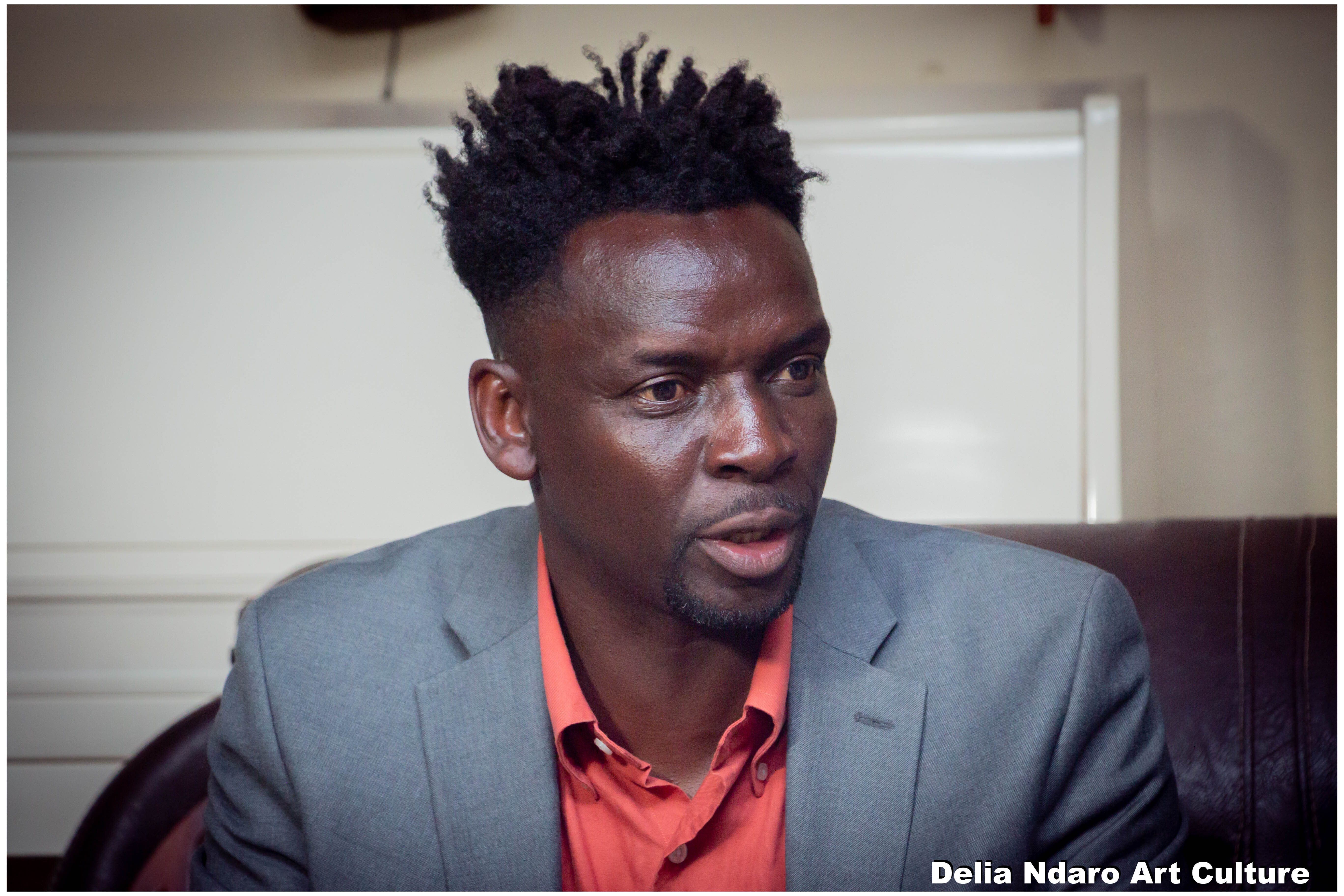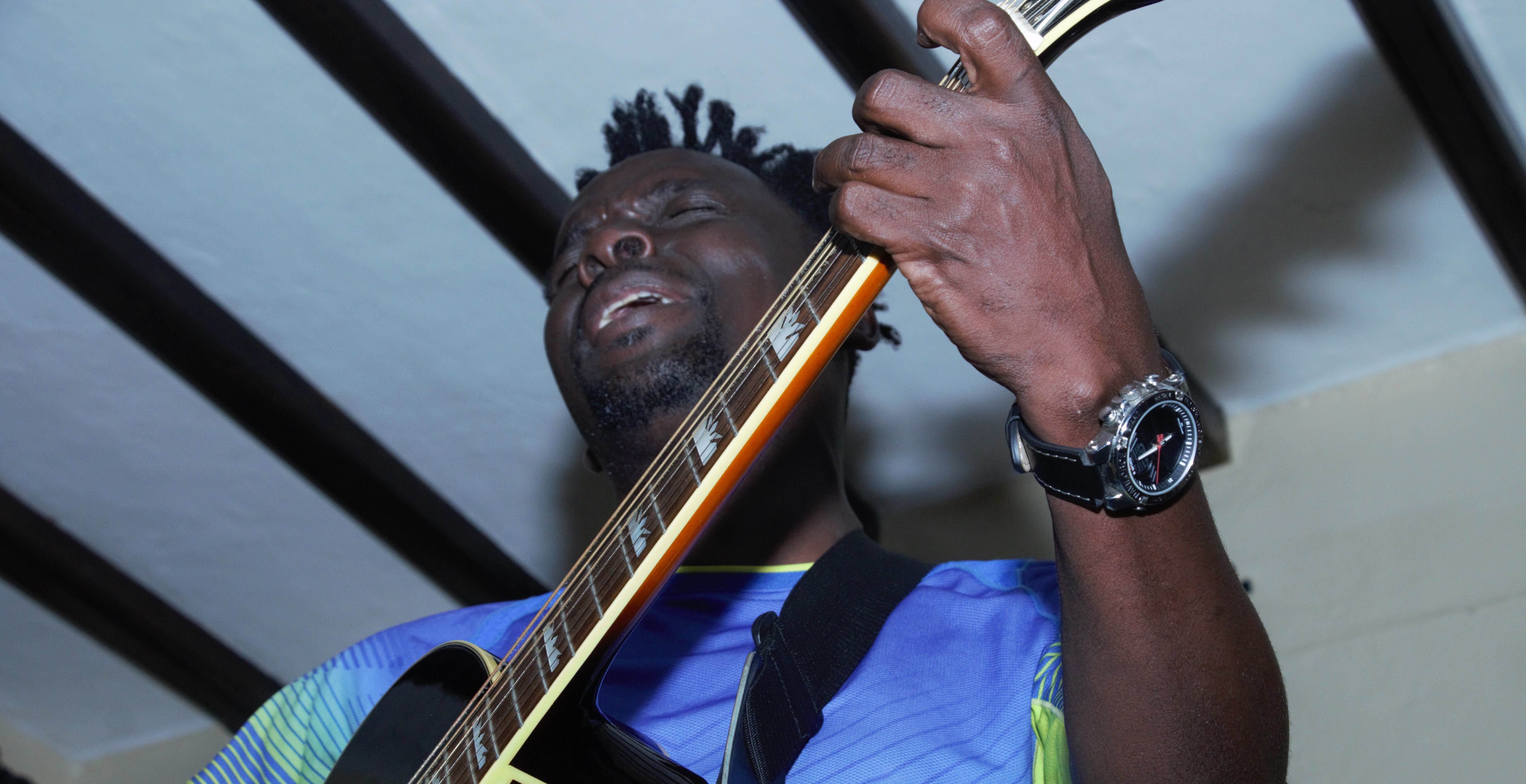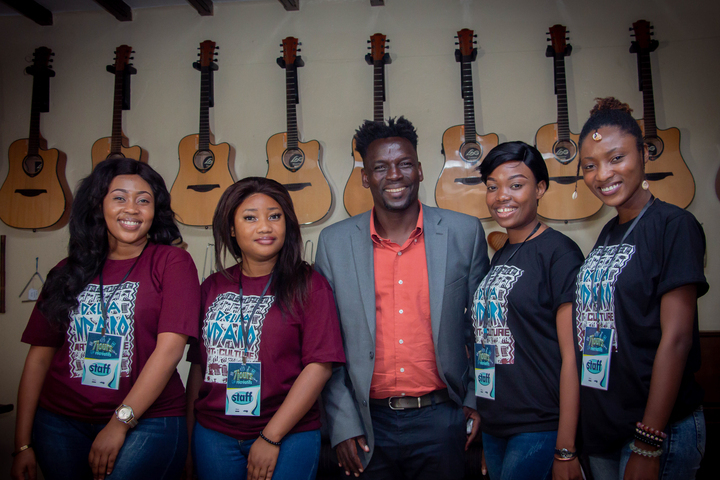Thomas Lusango is a Congolese artist, music teacher, musician and guitarist. Known to his students in Bukavu as “Maestro”, he is passionate about passing on knowledge, experiences, and passions related to music and the arts.
“We deal with a lot of vulnerable people who simply don’t have the means to pay for a music lesson. We are working with young girls to believe in their own abilities in life, and we do art therapy with street children in Bukavu.”
Through his work at Delia Ndaro Art Culture, Thomas is always busy promoting culture in Bukavu and giving back to the local community. He co-created the ‘Delia Ndaro Art Culture’ space on the conviction that unity is strength and that the promotion of the elevation of culture does not depend only on the government.
 Interview by Justin Nurse
Interview by Justin Nurse
(Justin): Ola Thomas! We understand that Bukavu is super busy at the moment, so thank you for giving up your time to fill us in on what’s been happening. What’s going on there at the moment?
(Thomas): We’ve started by meeting with local filmmakers and painters, as well as sound engineers and event organizers in Bukavu, as we lay the groundwork for our future plans for creating expression in the area.
We have events happening already: one related to showcasing Kivu fashion (Kivu is the name of our local lake, and we have a local, commonly worn fabric called Kitenge that is being worn in fresh and exciting ways that we are proudly showcasing). We also have a symphony and percussion event on the cards, and we’ve been busy recording the ‘loulanguistes’.
(Justin): What are the ‘loulanguistes’?
(Thomas): These are local musicians who are the guardians of our traditions. By recording them we aim to preserve their oral traditions. Singing about local myths and village history, they combine storytelling with the playing of traditional instruments such as the balafon, the likembe, the flute, the xylophone, and even the harp. These musical stories of everyday life have a rich history of the Congolese people that is important to preserve. The studio space at Delia-Ndaro Art Culture affords us this opportunity. You can donate money to this project here.
(Justin): How have locals reacted to the center?
(Thomas): The locals think that we are miracle workers, and trust that we can create opportunity by working together is growing. Sometimes there are days when not enough is happening, and people are here, just looking for opportunity. But this also speaks to their desire to succeed in their careers as artists.
They want us to become their producers, managers, publishing house, and handle their promotion… which is a lot for us to take on. My role is more about bringing all artistic structures together in the region. It’s about facilitating access to musical culture for all.
(Justin): How is life in Bukavu right now?
(Thomas): Life is calm and beautiful, except the politics of the country is very complicated and does not promise anything good. The artist is the first victim of all these confluences of land, tribal, political, and ethnic issues. Art is what suffers when there is political instability.
The involvement of Delia Arts Foundation has meant that we have renewed hope. People respect us for the ownership of the place (we have a new center with a professional studio), and we are developing a welcoming attitude that is being appreciated. Practically, not paying the monthly rental costs alone is also a great help.
(Justin): What international attention do you want to bring, through the center, to the work that you are doing?
(Thomas): With Delia, we have faith that we are providing a platform for artists to finesse their talents and then become known elsewhere. We have an existing prototype developmental model, working with former child soldiers in Bukavu. This was pioneered by BVES (Le Bureau pour le Volontariat au service de l’Enfance et de la Santé), which is a non-profit organization formed for the health, education, and protection of children.
We are working with young girls to believe in their own abilities in life, and we do art therapy with street children in Bukavu. A lot of what we do is very sensitive and trauma-related. Donors that can support our event projects should know that their money is being used to save children, former soldiers, and people living with disabilities. We deal with a lot of vulnerable people who simply don’t have the means to pay for a music lesson or to be supported in becoming an artist. The number of people who are lucky enough to be supported by our center is small in comparison with people struggling to survive on the streets. We implore people of goodwill to support us in our endeavor.
 (Justin): What are your plans for the center?
(Justin): What are your plans for the center?
(Thomas): We plan to develop the arts in general and music in particular. Once a week we organize an event – either music, painting, cinema, dance, or theater. Then, once a semester, we organize 7 recreational days centered around the arts in Bukavu. We keep ourselves busy to develop a way of engaging vulnerable children to find their bearing for their reintegration into the life of society. This is our model involving the use of sound, learning about the arts, and practicing art therapy.
(Justin): What help do you still need?
(Thomas): We need help making the world aware of the good, hard work that we are doing. We need better communication with the world via the internet, we need a stage for our concerts, and we need lighting and sound equipment so that we can perform in front of at least 800 people – and then broadcast Bukavu’s talents to the world!
On a more macro-level, we need to have exchanges between other structures in terms of financial and event management, as well as pedagogical education. We need funding for the programming of events and the organization of competitions for the best singers and musicians. All this is to facilitate the peaceful cohabitation of communities in our country.
(Justin) Do you have hope?
(Thomas): Yes, we ourselves have believed in what we are doing for 11 years already. We think by remaining united we are stronger and more steadfast. If other organizations support us for a few years and we get to do our events, we can perhaps become autonomous while relying on the experience of other organizations. The support of the Delia Arts Foundation and other affiliated organizations has been great so far.


